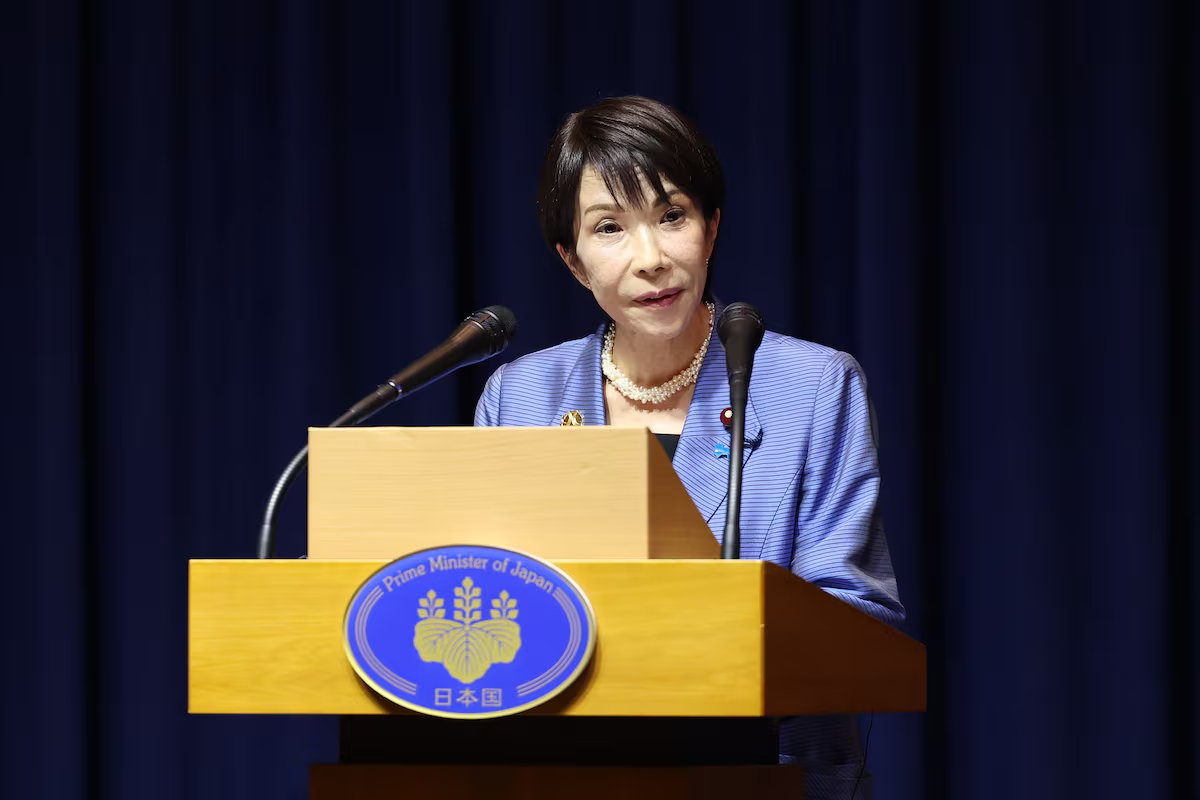China escalates spat with Japan over Taiwan in apparent warning to others

Open this photo in gallery:
China demands Japanese Prime Minister Sanae Takaichi retract comments about the potential dangers posed by a war over Taiwan.Chung Sung-Jun/Getty Images
China has banned imports of Japanese seafood and movies, cancelled trade talks and a trilateral summit, restricted tourism and flights to Japan, and is threatening further countermeasures if Tokyo does not retract comments by Prime Minister Sanae Takaichi about the potential dangers posed by a war over Taiwan.
The crisis, the latest in a years-long cycle of aggression and rapprochement toward Japan by China, was sparked by comments made by Ms. Takaichi in parliament that a Chinese invasion of Taiwan – long threatened by Beijing – could “constitute a situation threatening Japan’s survival,” the bar for the Japanese Self Defence Forces to engage in an ostensibly foreign conflict.
China has once again ramped up economic and military pressure against Taiwan – a self-ruled democracy never controlled by the Chinese Communist Party – taking advantage of uncertainty around U.S. commitments to the island and a desire from many countries to repair relations with Beijing to counterbalance Washington’s trade wars.
On Thursday, Taiwan’s Foreign Minister called on his 23 million compatriots to support Japan by travelling there and buying more Japanese products.
Lin Chia-lung accused China of using “economic and military coercion to bully other countries,” and said “Taiwan will support Japan at this critical time to effectively stabilize the situation and stop the CCP’s bullying.” Taiwanese President William Lai later posted photos on social media of him eating Japanese sushi and miso soup.
Open this photo in gallery:
This supplied photo taken and released by Taiwan’s Presidential Office on Thursday shows President William Lai having sushi and miso soup in a show of support for Tokyo.Supplied/AFP/Getty Images
While Japanese politicians and commentators have long warned that an attempt by China to annex Taiwan could drag Tokyo into the ensuing conflict, Ms. Takaichi’s remarks went further than her predecessors have in seeming to drop any ambiguity over whether Japan would intervene.
This was met with fury by Beijing, which unleashed a propaganda broadside against Ms. Takaichi in an attempt to force her to retract her comments. After this had little effect, China this week turned up the pressure, with restrictions on Japanese imports and threats of further action, even as Tokyo sent a top diplomatic representative to Beijing to try to calm tensions.
Speaking Thursday, Chinese Foreign Ministry spokeswoman Mao Ning said Ms. Takaichi’s “blatant and extremely wrong remarks on Taiwan have hurt the feelings of the Chinese people.”
She said a planned trilateral cultural summit between Japan, China and South Korea was “impossible to hold” in the current circumstances.
China demands Japanese PM retract Taiwan warning or ‘bear all consequences’
Japan has called for dialogue, suggesting Ms. Takaichi could meet Chinese Premier Li Qiang on the sidelines of a G20 summit in South Africa this weekend, but Ms. Mao dismissed any chance of this Thursday.
So far, Beijing has presented no off-ramp for the crisis – the worst since a dispute in 2023 over the release of treated water from the Fukushima nuclear disaster zone – other than for Ms. Takaichi to retract her comments. While Tokyo has suggested she would not repeat them, it has so far remained firm on not retracting her comments, pointing out they do not depart from Japan’s long-standing position on a potential Taiwan conflict.
Nor is it likely politically feasible for the conservative Ms. Takaichi, who heads a minority government, to retreat on this issue, particularly as she has made enlarging Japan’s military – in part because of the threats of a China-led conflict in East Asia – a key priority.
Before her confirmation as Prime Minister, which nearly didn’t take place – so tenuous is Ms. Takaichi’s coalition – Beijing was highly skeptical of the arch-conservative protégé of former leader Shinzo Abe, who advocated a more forceful foreign policy for Tokyo and under whom Sino-Japanese relations were often tense.
China warns Japan of ‘crushing’ defeat if it intervenes over Taiwan
After Ms. Takaichi’s election, she met with Chinese President Xi Jinping at a conference in South Korea, where he dressed her down on the issue of Taiwan, among others, according to a Chinese readout. Beijing’s apparent assumption that Ms. Takaichi would be a weak leader has proven incorrect however, as she has shown herself to be more adept than many critics expected, shoring up her unsteady coalition and currently riding high in domestic opinion polls.
Open this photo in gallery:
Members of the Japan Ground Self-Defense Force take part in an exercise at JGSDF Camp Naha in Okinawa Prefecture in June.PHILIP FONG/AFP/Getty Images
China’s aggression may have helped with this: There was widespread outrage in Japan when Beijing’s envoy to Osaka suggested (in later-retracted remarks) a proper response to those who comment on Taiwan would be to “chop off their dirty heads without a moment of hesitation.” In attacking Ms. Takaichi, Chinese media has also revived claims about the supposedly unsettled status of Okinawa, the southern Japanese island many commentators have said could be threatened by Beijing were an invasion of Taiwan to go unopposed.
Japanese conservatives have long sought to reform the country’s pacifist post-Second World War constitution, removing restrictions on the SDF and allowing it to expand. Mr. Abe made some progress on this issue, and Ms. Takaichi could push it over the line, particularly as her new coalition includes a right-wing, pro-reform party, in place of the centrist, more pacifist Komeito, the traditional partner of her ruling Liberal Democratic Party.
“China worries that Ms. Takaichi, unchecked, will take more steps to strengthen Japan’s military posture,” Walter Russell Mead, a national security expert at the Hudson Institute, a conservative U.S. think tank, wrote this week. “Beijing hopes to undermine Ms. Takaichi’s power before she can fully consolidate her position.”





